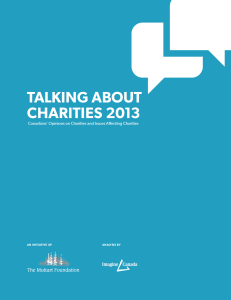Perception and trust: can marketing communications help with public trust in charities? [research review]
Perception. It’s a reality many nonprofit marketing communications professionals face in their strategy development and day-to-day work. How our organizations are perceived by our donors, funders, media, and other stakeholders shape our marketing, communications and fundraising efforts. Perceptions are the result of a process by which individuals interpret the information from the world around them, selecting what is important to their needs, values and desires.In general marketing terms, it affects purchasing decisions and overall consumer behaviour.
In the nonprofit marketing communications world, it affects our earned income efforts (products and services), donations and funding, organizational branding and much more. This is why, as MarComm professionals, having access to research on the opinions about charities and the issues affecting our charities is of the utmost importance.
Let’s Discuss Trust. The good and the “uh-oh”.
The recently released Talking About Charities report by The Muttart Foundation (with analysis by Imagine Canada) is one I encourage my MarComm colleagues, and those with a strong interest in MarComm or fundraising for their organizations, to grab a cup of your favourite hot beverage and sit down and read it – right now! Okay, if you can’t right now, let’s discuss some of the main elements.
I asked Bob Wyatt, Executive Director of The Muttart Foundation, his thoughts about the Talking About Charities report as it relates to marketers and communicators and some of the things they should know, “There’s some very good news in Talking About Charities. People trust us, they know that we improve the quality-of-life of the people we serve and they recognize the importance of charities to Canadians and those outside of Canada who we serve.” Good news indeed and to paraphrase Sally Field’s 1985 Oscar speech, “You like us, you really like us!”
The good news certainly makes aspects of our jobs easier. In fact, 79% of Canadians have some or a lot of trust in charities. This exceeds the trust levels given to the federal government (45%), provincial governments (44%), local governments (57%), the media (53%) and major corporations (41%). It’s a rather enviable position for the sector (and nonprofit MarComm professionals) to be in. Only small business received a higher trust level at 81%.
However, with all the good news it doesn’t mean we can rest on our laurels. There are warning signs of potentially challenging times ahead. Wyatt summarizes causes for concern on how we do and communicate our work, “There are significant numbers of Canadians who don’t believe that we spend money wisely or that we are generally honest with them about how we use the money they donate to us. And they don’t think we’re doing a very good job at telling them about ourselves. We have to learn how to tell our story better: not just the story of how many wonderful things we do, but also the story of how we operate.”
While overall trust in charities and nonprofits is high, there are certain types of charities that are trusted more than others. The research indicates varying trust levels for the following sub-sectors:
- Hospitals: 86%
- Children’s charities: 82%
- Environmental charities: 67% trust level
- Arts organizations: 60%
- Churches and other places of worship: 59%
- International development organizations: 50%
Making work for MarComm professionals in the latter four sub-sectors much more challenging.
Additionally, even though trust levels in most types of charities have been at relatively consistent levels, there are some troubling exceptions.
- Trust in churches and other places of worship has dropped significantly from 67% in 2006 to 59% in 2013.
- International development and relief charities have dropped from a high of 59% in 2008 to 50%, and
- Environmental protection charities have gone from 73% in 2006 to 67%.
What can MarComm do to build trust in your organization?
How can MarComm help and reinforce an individual’s trust in an organization? Trust is developed through a series of interactions and exchanges built on shared interests which, in time, evolve into a set of mutual expectations. It’s about relationship building and we can be very good at that. So, along with your colleagues, especially your fundraising ones, here are a few things you can do to help individuals to better trust your organization:
1. Provide access to information.
In the Talking About Charities report, Canadians give charities low ratings for the degree to which they report on how donations are used, the impact of programs and their fundraising costs. They want and are looking for this information, whether it’s your annual report or a follow up to a recent fundraising endeavor. Transparency is the key to trust here and we need to make sure information is readily and easily found – your website is a great place to start.
2. Ensure impact is part of your storytelling.
Take the next step and build upon the information you’ve made available and give it context. For example, annual reports should go beyond reporting the numbers (such as percentages of campaign targets achieved). Some of these numbers may be important internal measures but they don’t always effectively communicate your organization’s impact on the issues you are trying to solve for the community you serve.
3. Accreditation, certification and codes – oh my!
There are various sector and sub-sector accreditation, certification and codes of conduct programs in Canada. Don’t be shy to showcase your achievements to your supporters by prominently featuring them on your web properties and in other outreach materials. An example of an accreditation program for charities is Imagine Canada’s Standards Program (bias disclosure: I’m an Imagine Canada employee) which, once accreditation is achieved, demonstrates your organization’s excellence in board governance, financial accountability and transparency, fundraising, staff management and volunteer involvement.
What can MarComm professionals do to build trust in the sector?
As a profession we may not have an official Hippocratic Oath, with its essence of “do no harm” as physicians and other healthcare professionals do, but we do need be mindful of our role and impact as the main message creators and delivery system of the sector. And, for the most part, I believe we’re an exemplary lot. However, there are times that we may work at cross-purposes as sector communicators and unintentionally send out mixed messages to the public. This can sometimes be seen in how we talk about the investments we make in carrying out our missions (what we spend on fundraising, overhead and compensation for example — the myths, legends of Bigfoot and race to the bottom we self-perpetuate).
Bob Wyatt touches upon the sector’s collective role with public trust, “We have to demonstrate that we continue to deserve their trust. And we have to point out to them that charities are probably more transparent and accountable than any other segment of our society. We can’t do this only as a group of individual agencies: we have to do that, of course, but we also have to start learning to speak as a sector. And we had better start learning how to do it soon.”
Of course, there are external factors which may contribute to the decline of trust and change in perceptions. One could surmise that misinformed or unflattering portrayals about charities in the media, well-intentioned but not helpful ranking systems, and political opinions about the role of charities in public policy have all played their part. This is why it is so important to come together as nonprofit marketing communications professionals, to use our storytelling skills to the best of our abilities, to help shape and steer the narrative about the charitable sector in order to solidify and grow positive perceptions and further instil public trust.
Take the MarComm Vow
As charity and nonprofit MarComm professionals, we are typically focused on our organizations to help ensure it’s delivering on mission and is making an impact in the communities it serves. But let’s not forget the impact we have collectively on the perceptions of the sector and public trust. Therefore, I encourage my fellow communicators to make a vow to support the sector in its goals and to honor, to cherish and respect the public trust, in times of great accomplishments and challenges from this day forward for as long as we may communicate. I do.

![Perception and trust: can marketing communications help with public trust in charities? [research review]](https://nonprofitmarcommunity.com/wp-content/uploads/2014/01/Trust.jpg)

 PRINT
PRINT

